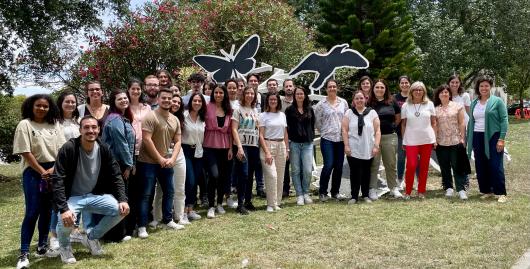Research Lab
Biochemical Engineering

29663
Lab Members
Lab leader
Senior Researcher
Junior Researcher
PhD students
Master Students
Technicians
Other members
Research Interests
The Biochemical Engineering (BIOENG) lab is devoted to the areas of Industrial and Environmental Biotechnology with main focus on: Micropollutants, Biological Nutrient Removal and Recovery; Greenhouse Gas Emissions; Production and Characterization of Polyhydroxyalkanoates (PHAs), Microbial Polysaccharides and Bulk Chemicals. Learn more about our projects at “Noite Europeia dos Investigadores 2020 - atividade “De resíduos a bioplásticos”.
Research Highlights
AgriLoop: Pushing the frontier of circular agriculture by converting residues into novel economic, social and environmental opportunities
The AgriLoop European and Chinese project strategy is focused around collaboration and partnership. Working together the project partners will eco-efficiently upgrade under-exploited agricultural residues into a portfolio of high added-value bio-products able to generate new bio-based markets or to compete with, and gain market share of, oil- and food crops- based equivalents.
To know more visit our project website page.

Representative Projects
-
H2020-FNR-2020 - 210673508 (PROMICON) HARNESSING THE POWER OF NATURE THROUGH PRODUCTIVE MICROBIAL CONSORTIA IN BIOTECHNOLOGY – MEASURE, MODEL, MASTER. (2021-2025). Total funding: € 5. 999.712,50 Unit funding: € 838.750,00
-
HORIZON-EIC-2022-PATHFINDEROPEN-01-01 210855940 (BioLaMer) Proof of principle fly larvae biorefinery for biopolymer plastic production (2023-2026) Total funding: 2, 956, 826.00€ Unit funding: 715, 454€.
-
HORIZON-EIC-2021-PATHFINDEROPEN-01 101046758 (ECOPLASTIC) Eco conversion of lower grade PET and mixed recalcitrant PET plastic waste into high performing biopolymers (2022-2025) Total funding: 3, 045, 503€ Unit funding: 564,250€.
-
HORIZON-CL6-2022-CIRCBIO-01 101081776 (AgriLoop) Pushing the frontier of circular agriculture by converting residues into novel economic, social and environmental opportunities (2022-2026) Total funding: 7, 825 297€ Unit funding: 425, 000€.
-
HORIZON-MISS-2022-OCEAN-01-04 - 10112877 (UPSTREAM) Circular and Bio-Based Solutions for the Ultimate Prevention of Plastics in Rivers Integrated with Elimination And Monitoring Technologies (2023-2027) Total funding: 7024 032.90€ Unit funding: 695 599.25€.
Selected Publications
Almeida, JR; Leon, ES; Corona, EL; Fradinho, JC; Oehmen, A; Reis, MAM. 2023. Ammonia impact on the selection of a phototrophic - chemotrophic consortium for polyhydroxyalkanoates production under light-feast / dark-aerated-famine conditions. WATER RESEARCH, 244, DOI: 10.1016/j.watres.2023.120450
Concordio-Reis, P; Ferreira, SS; Alves, VD; Moppert, X; Guezennec, J; Coimbra, MA; Reis, MAM; Freitas, F. 2023. Rheological characterization of the exopolysaccharide produced by Alteromonas macleodii Mo 169. INTERNATIONAL JOURNAL OF BIOLOGICAL MACROMOLECULES, 227, DOI: 10.1016/j.ijbiomac.2022.12.117
Esmail, A; Torres, CAV; Ortiz-Albo, P; Marques, AC; Gonçalves, A; Neves, LA; Pinto, JV; Reis, MAM; Freitas, F. 2023. Characterization of bacterial cellulose produced by <i>Komagataeibacter xylinus</i> strains grown in styrene/glucose mixtures. CELLULOSE, DOI: 10.1007/s10570-023-05559-0
Silva, F; Matos, M; Pereira, B; Ralo, C; Pequito, D; Marques, N; Carvalho, G; Reis, MAM. 2022. An integrated process for mixed culture production of 3-hydroxyhexanoa-te-rich polyhydroxyalkanoates from fruit waste. CHEMICAL ENGINEERING JOURNAL, 427, DOI: 10.1016/j.cej.2021.131908
Almeida, JR; Serrano, E; Fernandez, M; Fradinho, JC; Oehmen, A; Reis, MAM. 2021. Polyhydroxyalkanoates production from fermented domestic wastewater using phototrophic mixed cultures. WATER RESEARCH, 197, DOI: 10.1016/j.watres.2021.117101
Pereira, JR; Araujo, D; Freitas, P; Marques, AC; Alves, VD; Sevrin, C; Grandfils, C; Fortunato, E; Reis, MAM; Freitas, F. 2021. Production of medium-chain-length polyhydroxyalkanoates by Pseudomonas chlororaphis subsp. aurantiaca: Cultivation on fruit pulp waste and polymer characterization. INTERNATIONAL JOURNAL OF BIOLOGICAL MACROMOLECULES, 167, DOI: 10.1016/j.ijbiomac.2020.11.162
Guerreiro, BM; Freitas, F; Lima, JC; Silva, JC; Dionisio, M; Reis, MAM. 2020. Demonstration of the cryoprotective properties of the fucose-containing polysaccharide FucoPol. CARBOHYDRATE POLYMERS, 245, DOI: 10.1016/j.carbpol.2020.116500
